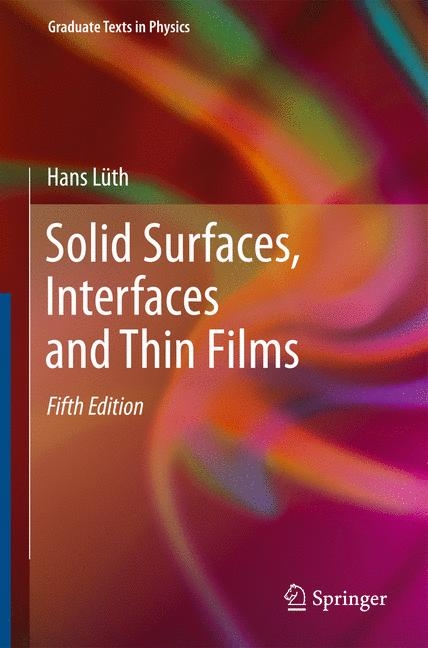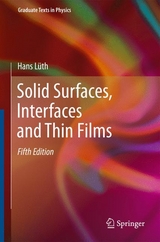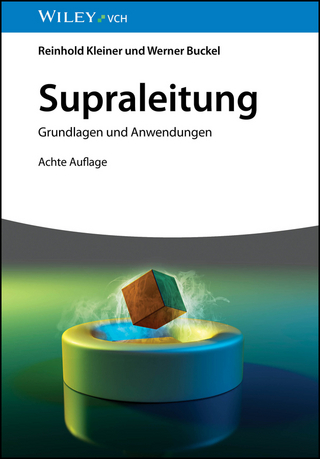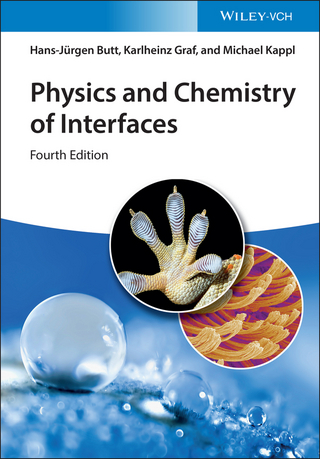Solid Surfaces, Interfaces and Thin Films
Springer Berlin (Verlag)
978-3-642-13591-0 (ISBN)
- Titel erscheint in neuer Auflage
- Artikel merken
The fourth edition of “Solid Surfaces, Interfaces and Thin Films” has been used meanwhile as a standard textbook around the world at many universities and research institutions. Even though surface and interface physics have become a mature science branch, their theoretical concepts and experimental techniques are of higher importance than ever before because of their impact on nanostructure physics. Surface and interface physics form the basis for modern nanoscience, be it in quantum electronics, in catalysis, in corrosion, or in lubrication research. This explains the ever-growing demand for education in these elds. It was therefore time to carefully revise the book and bring it up to latest dev- opments both in fundamental research and in application. Concerning new ma- rial aspects topics about group III nitride surfaces and high k-oxide/semiconductor heterostructures have been included. Recent developments in these material classes are of essential importance for high-speed/high-power electronics and advanced - based CMOS technology on the nanometer scale. The novel eld of spin electronics or spintronics having been initiated by the detection of the giant magnetoresistance (GMR) by Peter Grünberg and Albert Fert (Nobel Prize 2007) required a more extensive consideration of anisotropy effects in thin magnetic lms. For the devel- ment of purely electrical spin switching devices based on spin effects rather than on semiconductor space charge layers, a prerequisite for high-speed, low-power sp- tronics, the spin-transfer torque mechanism shows some promise. Correspondingly this topic is discussed in direct connection with the GMR in this new edition.
Hans Lüth was born in Aachen, Germany, in 1940. He received the diploma in physics in 1965 and the doctoral degree (PhD) in physics in 1968, both from the Aachen University of Technology (RWTH). Between 1974 and 1986 he held several guest scientist and visiting professor positions at the IBM Thomas J. Watson Research Centre (USA), the Universities of Paris (F), Aix-Marseille (F) and Modena (I). Since 1980 he has been professor for physics and since 2000 simultaneously professor for electrical engineering at the RWTH Aachen. Additionally, in 1988 he became the director of the Institute of Bio- and Nanosystems at the Research Centre Jülich, Germany. In 2006 and 2007 he was Research Director for Key Technologies at the Research Centre Jülich. For his scientific work and for his globally used text books he was awarded the Doctor Honoris Causa by the Universite de Haute-Alsace, Mulhouse-Colmar (F). His research interests center around semiconductor interface physics and quantum electronics.
Surface and Interface Physics: Its Definition and Importance.- Preparation of Well-Defined Surfaces and Interfaces.- Morphology and Structure of Surfaces and Interfaces.- Scattering from Surfaces.- Surface Phonons.- Electronic Surface States.- Space-Charge Layers at Semiconductor Interfaces.- Metal-Semiconductor Junctions, and Semiconductor Heterostructures.- Collective Phenomena at Interfaces: Superconductivity and Ferromagnetism.- Adsorption on Solid Surfaces
| Erscheint lt. Verlag | 5.9.2010 |
|---|---|
| Reihe/Serie | Graduate Texts in Physics |
| Zusatzinfo | XVI, 580 p. 418 illus., 8 illus. in color. |
| Verlagsort | Berlin |
| Sprache | englisch |
| Maße | 155 x 235 mm |
| Gewicht | 976 g |
| Themenwelt | Naturwissenschaften ► Physik / Astronomie ► Atom- / Kern- / Molekularphysik |
| Naturwissenschaften ► Physik / Astronomie ► Theoretische Physik | |
| Naturwissenschaften ► Physik / Astronomie ► Thermodynamik | |
| Schlagworte | Adsorption • Anistropy effects in thin magnetic films • Giant Magnetor • giant magnetoresistance • Grenzfläche • Group III-nitride surfaces • High K-oxide/semiconductor heterostructures • Kerr effect • magnetic anisotropy • Nano-CMOS technology • Oberfläche • Oxide/semiconductor interface • Semiconductor interfaces • Spin polarized Scanning Tunnelling Microscopy • Spin-transfer torque mechanism • Surfaces science |
| ISBN-10 | 3-642-13591-9 / 3642135919 |
| ISBN-13 | 978-3-642-13591-0 / 9783642135910 |
| Zustand | Neuware |
| Informationen gemäß Produktsicherheitsverordnung (GPSR) | |
| Haben Sie eine Frage zum Produkt? |
aus dem Bereich




